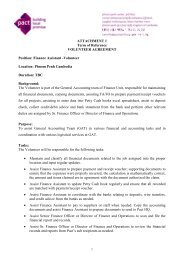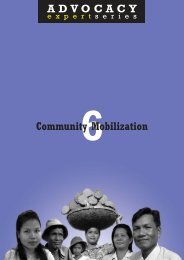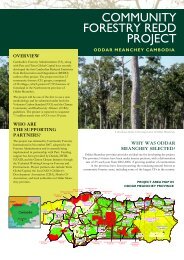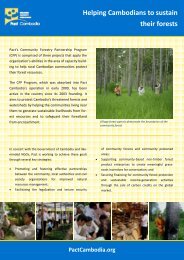Advocacy in Cambodia: Increasing Democratic ... - Pact Cambodia
Advocacy in Cambodia: Increasing Democratic ... - Pact Cambodia
Advocacy in Cambodia: Increasing Democratic ... - Pact Cambodia
Create successful ePaper yourself
Turn your PDF publications into a flip-book with our unique Google optimized e-Paper software.
Increas<strong>in</strong>g <strong>Democratic</strong> Space<br />
A number of NGOs are becom<strong>in</strong>g<br />
strong advocacy organizations,<br />
but most NGOs have not matured<br />
to the po<strong>in</strong>t where they can do<br />
strong advocacy.<br />
advocacy organizations, but most NGOs have not<br />
matured to the po<strong>in</strong>t where they can do strong<br />
advocacy. Their primary concern rema<strong>in</strong>s with the<br />
development of their organization and programs.<br />
Areas <strong>in</strong> which NGOs have developed some<br />
capacity <strong>in</strong>clude research, plann<strong>in</strong>g, network<strong>in</strong>g<br />
and lobby<strong>in</strong>g, though there is room for<br />
improvement. Lack of experience expla<strong>in</strong>s some<br />
easily made mistakes and advocates <strong>in</strong> <strong>Cambodia</strong><br />
are quickly learn<strong>in</strong>g from these mistakes. For<br />
example, the various NGOs <strong>in</strong>volved <strong>in</strong> the<br />
monitor<strong>in</strong>g the widen<strong>in</strong>g of National Route 1 were<br />
not used to hav<strong>in</strong>g different agencies work<strong>in</strong>g on<br />
the same issue. Some were do<strong>in</strong>g monitor<strong>in</strong>g for<br />
the Asia Development Bank and others were do<strong>in</strong>g<br />
<strong>in</strong>dependent monitor<strong>in</strong>g. It took some time for the<br />
NGOs to realize that each group had an important<br />
and separate role to play. Another example of<br />
shortsighted lobby<strong>in</strong>g is <strong>in</strong> the case of the<br />
community fisheries lobby<strong>in</strong>g, where lobby<strong>in</strong>g<br />
efforts did not stay far enough ahead <strong>in</strong> the<br />
legislative process. Both types of mistakes are<br />
unlikely to be repeated by the organizations<br />
<strong>in</strong>volved <strong>in</strong> these efforts and carry important<br />
lessons learned for other sectors.<br />
There is a need for advocacy <strong>in</strong>termediaries<br />
and <strong>in</strong>stitutions that focus on policy formulation.<br />
Very few NGOs have this specialization and are<br />
better at collect<strong>in</strong>g <strong>in</strong>formation from communities<br />
that is important for policy formulation.<br />
Network<strong>in</strong>g<br />
Civil society organizations <strong>in</strong> <strong>Cambodia</strong> have<br />
developed numerous networks, but most of these<br />
focus on <strong>in</strong>formation shar<strong>in</strong>g and do not have<br />
action plans or advocacy agendas. The most<br />
effective networks are those that come together<br />
for special events and groups like the Human<br />
Rights Action Committee that meets to solve<br />
particularly challeng<strong>in</strong>g human rights cases.<br />
Problems regard<strong>in</strong>g networks <strong>in</strong>clude the<br />
difficulty <strong>in</strong> understand<strong>in</strong>g when a network has<br />
outlived its usefulness, lack of coord<strong>in</strong>ation<br />
between networks, and lack of experience <strong>in</strong><br />
build<strong>in</strong>g alliances. Critics of networks also cite the<br />
absence of community leaders at network<br />
meet<strong>in</strong>gs and failure to build <strong>in</strong> consultation with<br />
the constituencies that the networks represent.<br />
Network<strong>in</strong>g at the prov<strong>in</strong>cial level tends to<br />
be relatively strong, probably because NGOs ga<strong>in</strong><br />
a sense of solidarity from the meet<strong>in</strong>gs, there is a<br />
greater probability of <strong>in</strong>formal <strong>in</strong>teraction, and the<br />
networks encounter difficult challenges that<br />
directly affect their work with communities.<br />
Network meet<strong>in</strong>gs tend to focus on <strong>in</strong>formation<br />
shar<strong>in</strong>g, although there are occasionally examples<br />
of group advocacy, particularly among NGOs <strong>in</strong><br />
Battambang. In one case of illegal land<br />
appropriation <strong>in</strong> Kompong Thom, NGOs<br />
successfully lobbied at the prov<strong>in</strong>cial and national<br />
levels to put a stop to violations.<br />
There are a number of examples of<br />
<strong>Cambodia</strong>n NGOs participat<strong>in</strong>g <strong>in</strong> regional and<br />
<strong>in</strong>ternational networks, although most activities<br />
center on conferences and <strong>in</strong>formation exchange.<br />
It is only <strong>in</strong> a few isolated cases that NGOs from<br />
<strong>Cambodia</strong> have been able to advocate for change<br />
outside of the country, as <strong>in</strong> the aforementioned<br />
example of add<strong>in</strong>g traffick<strong>in</strong>g to the agenda of the<br />
ASEAN Confederation of Women’s Associations.<br />
NGOs <strong>in</strong> <strong>Cambodia</strong> are learn<strong>in</strong>g to work with<br />
<strong>in</strong>ternational actors, such as garment companies,<br />
donors, and <strong>in</strong>ternational networks and beg<strong>in</strong>n<strong>in</strong>g<br />
to earn <strong>in</strong>ternational recognition <strong>in</strong> the form of<br />
honorary awards, particularly <strong>in</strong> the field of<br />
human rights. At the same time, there are risks<br />
<strong>in</strong>volved <strong>in</strong> <strong>in</strong>ternational representation and NGO<br />
representatives need to be sure that they are well<br />
prepared and strategic when do<strong>in</strong>g <strong>in</strong>ternational<br />
lobby<strong>in</strong>g, particularly <strong>in</strong> forums that affect the<br />
government, such as the annual Consultative<br />
Group meet<strong>in</strong>g of donors on <strong>Cambodia</strong> that<br />
carries sufficient legitimacy for their<br />
recommendations.<br />
It is important for civil society organizations<br />
to understand the central role of network<strong>in</strong>g and<br />
to avoid limit<strong>in</strong>g advocacy activities to their own<br />
programs or to participat<strong>in</strong>g <strong>in</strong> fragmented or<br />
weak networks. Without effective networks, it is<br />
impossible for NGOs to address larger problems<br />
that affect communities at the local level.<br />
Development organizations do not need to do<br />
advocacy themselves. By be<strong>in</strong>g a member of a<br />
strong network they can stay <strong>in</strong>formed and lend<br />
legitimacy to an advocacy campaign.<br />
Another important strategy is to build<br />
alliances with organizations that are work<strong>in</strong>g on<br />
different aspects or levels of a problem. For<br />
example <strong>in</strong> the case of land disputes, some<br />
agencies work at the grassroots level assist<strong>in</strong>g<br />
communities with disputes, others provide legal<br />
assistance and yet others assist with the<br />
documentation of the problem. Once a change<br />
objective has been achieved, the network or<br />
alliance can disband. The strengthen<strong>in</strong>g of<br />
effective advocacy networks through specific<br />
activities like creat<strong>in</strong>g sectoral maps and an<br />
advocacy action plan can be considered an<br />
important strategy for agencies aim<strong>in</strong>g to<br />
strengthen advocacy <strong>in</strong> <strong>Cambodia</strong>.<br />
32
















